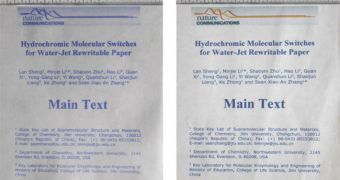A recent paper in the journal Nature Communications details the development of a new type of paper that uses water as ink and whose large-scale use researchers claim would yield noteworthy environmental benefits.
The scientists who developed this innovative paper explain that their creation owes its eco-friendliness to the fact that it has been treated with so-called hydrochromic dyes.
These dyes, which are embedded in the paper, change color when they become wet, the researchers go on to detail. This means that, instead of using regular ink to make messages appear on the paper, one should only get it wet.
According to Yale Environment, the researchers who worked on this project found that, as surprising as this may sound, those who wish to turn to using this paper instead of regular one need only refill standard ink cartridges with water and then start printing.
The same source tells us that, as the paper begins to dry, the message inscribed on it fades away. Apparently, it only takes about 22 hours for it to disappear entirely. Once this happens, the paper can be reused.
Specialists say that, according to their investigations into the matter at hand, about 90% of business information is currently retained on paper. However, it often happens that, only a short while after they have been read, documents get tossed away.
Due to the fact that the paper treated with hydrochromic dyes can be reused several dozen times without a significant loss in color quality, it is expected that, should offices embrace this technology, the amount of waste that they create on a yearly basis would be greatly reduced.
What's more, since water is as eco-friendly as its gets, having it replace standard inks would also help improve on a given office's ecological footprint.
“This rewritable paper is promising in that it can serve an eco-friendly information display to meet the increasing global needs for environmental protection,” the scientists who invented the rewritable paper explain.

 14 DAY TRIAL //
14 DAY TRIAL //